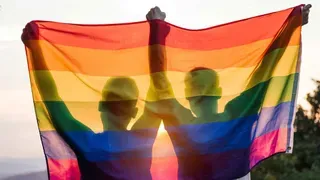February 22, 2014
Human Rights Pledge Urged for Future Olympic Hosts
Bobby McGuire READ TIME: 3 MIN.
Citing widespread dismay with Russia's anti-gay laws, a coalition of more than 30 human rights and gay rights groups is calling on the International Olympic Committee to ensure that future Olympic host countries do not have discriminatory laws on their books.
The coalition - including Human Rights Watch, Amnesty International and the Human Rights Campaign - made the demands in a joint letter to IOC President Thomas Bach as the Winter Olympics in Sochi, Russia, neared their close. Activists in Russia and abroad have tried to use the games to draw attention to the Russian law banning so-called gay "propaganda," which they say deters a wide range of gay-rights activities.
In their letter to Bach, being released on Friday, the groups said that future contracts between the IOC and host cities should include specific human rights pledges and a commitment not to introduce laws or policies before the Olympics that would violate human rights.
"The contracts should include clear sanctions for failing to respect these commitments, up to and including a relocation of the games," the letter said.
The letter also urged the IOC to amend Principle 6 of the Olympic Charter to specify that the Olympic movement's condemnation of discrimination extends to discrimination based on sexual orientation and sexual identity.
IOC spokesman Mark Adams, addressing this matter while in Sochi, has said that the IOC charter covers all discrimination, including sexual orientation. But he said the proposed wording could be considered during upcoming IOC deliberations.
"We have a good constructive dialogue with Human Right Watch," Adams said Saturday. "We will read, digest and reflect on their suggestions before giving a considered response."
As to broader human rights questions, Adams has said these could be addressed as part of a review of the Olympic Charter and other regulations. The IOC will meet in a special session in December in Monaco to vote on proposed changes and recommendations as part of Bach's proposed blueprint for the future, called "Olympic Agenda 2020."
The letter from the rights groups said the IOC "could indeed be a force for good" if it bolstered its criteria in regard to human rights.
"The worldwide wave of outrage spurred by Russia's discriminatory anti-LGBT laws should be a warning - one that should not be repeated," the letter said. "Countries with laws designed to discriminate against or attack the dignity or human rights of any individual or group ... should not be given the honor and privilege of hosting the Olympic Games."
According to Human Rights Watch, other abuses resulting from Russia's preparations for the Sochi Games included the exploitation of workers on Olympic venues, forced evictions of families to make way for construction, environmental and health hazards, and the stifling of journalists' efforts to document these abuses.
Minky Worden, director of global initiatives for Human Rights Watch, noted that some past reforms by the IOC - including a crackdown on doping and changes in its own governance - came about at least in part because of outside pressure.
"It has taken major global outrage, of the kind we've seen with Sochi, to spur changes in the Olympic movement," she said. "It's never fast, it's never easy.
"The IOC had plenty of warning to cope with these abuses in Russia," she added. "They failed to do that. The moment has arrived when there needs to be institutional reform."






